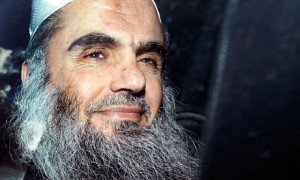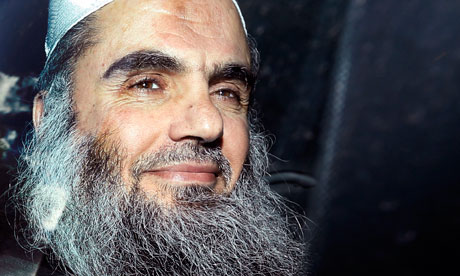 Radical cleric Abu Qatada has appeared in court in Jordan after being deported from the UK. His plane left RAF Northolt at 02:46 BST for his home country, where he was formally charged with terror offences, which he denies. Prime Minister David Cameron said he was “delighted” at his removal. Abu Qatada was first arrested in the UK over alleged terror connections in 2001. He was rearrested in 2005, when attempts to deport him began. The Palestinian-Jordanian cleric’s deportation was finally able to proceed after the UK and Jordan signed a treaty agreeing that evidence obtained through torture would not be used against him.
Radical cleric Abu Qatada has appeared in court in Jordan after being deported from the UK. His plane left RAF Northolt at 02:46 BST for his home country, where he was formally charged with terror offences, which he denies. Prime Minister David Cameron said he was “delighted” at his removal. Abu Qatada was first arrested in the UK over alleged terror connections in 2001. He was rearrested in 2005, when attempts to deport him began. The Palestinian-Jordanian cleric’s deportation was finally able to proceed after the UK and Jordan signed a treaty agreeing that evidence obtained through torture would not be used against him.
Home Secretary Theresa May said she was glad that the government’s determination to remove him had been “vindicated”. “This dangerous man has now been removed from our shores to face the courts in his own country,” she said. She added that she wanted to streamline such deportation processes in future. “I am also clear that we need to make sense of our human rights laws and remove the many layers of appeals available to foreign nationals we want to deport.
Speaking on BBC Breakfast, Mrs May said she had been provided with updates on the deportation throughout the night and that she had been “as frustrated as the public” about the estimated £1.7m cost and length of time it had taken to remove Abu Qatada, but that people would welcome the end result.
There was tight security as Abu Qatada arrived back in Jordan – where he grew up – for the first time in more than 20 years. He was immediately driven from Marka airbase to the state security court – a journey that would have taken just a few minutes. After the hearing his lawyer Tayseer Diab said: “The attorney general interrogated him today, and he directed a series of accusations towards him – he accused him of conspiracy to take part in terrorist acts. My client denied all the allegations, and he asserts that his return to Jordan was out of his own free will, in order to be with his family. The procedure was carried out well, and he received good treatment.”
Asked whether Abu Qatada’s wife and children would have the right to stay in the UK, Mrs May said they would have to decide what they want their future to be before the government gets involved.






